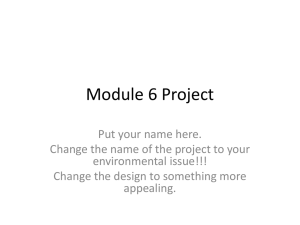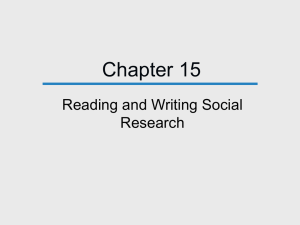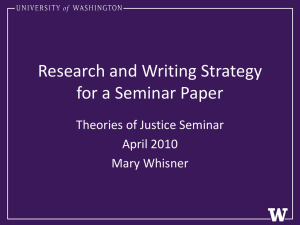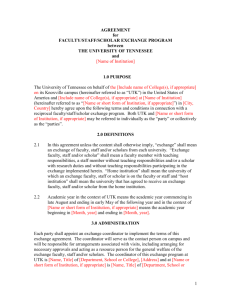DATA DESCRIPTION - The International Economy
advertisement
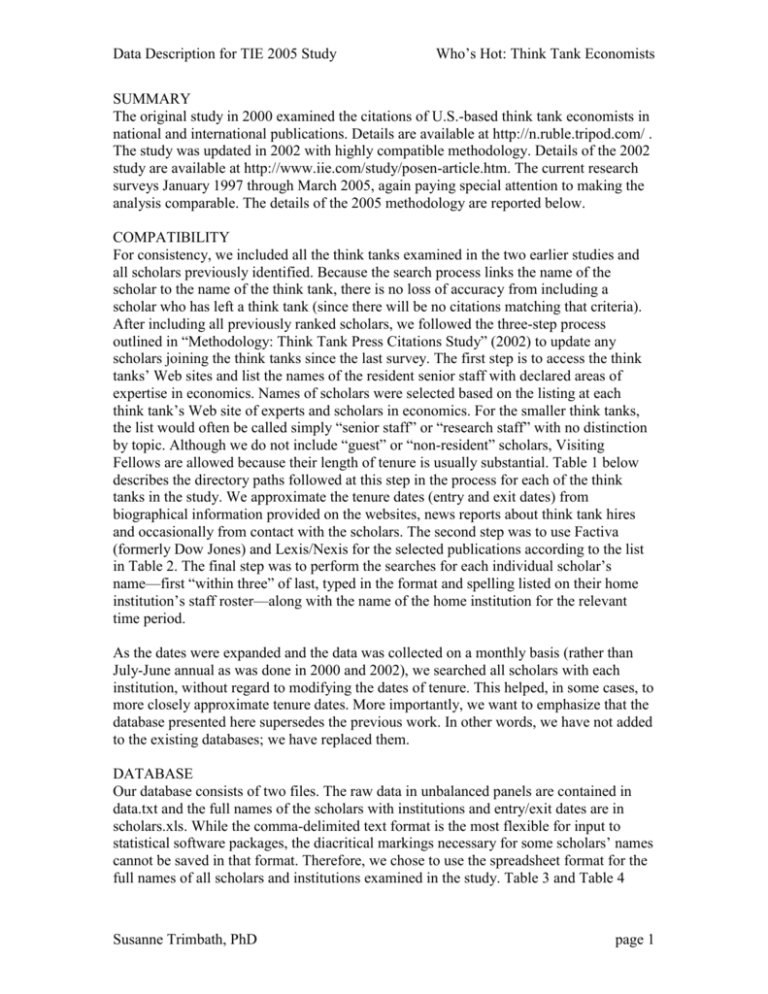
Data Description for TIE 2005 Study Who’s Hot: Think Tank Economists SUMMARY The original study in 2000 examined the citations of U.S.-based think tank economists in national and international publications. Details are available at http://n.ruble.tripod.com/ . The study was updated in 2002 with highly compatible methodology. Details of the 2002 study are available at http://www.iie.com/study/posen-article.htm. The current research surveys January 1997 through March 2005, again paying special attention to making the analysis comparable. The details of the 2005 methodology are reported below. COMPATIBILITY For consistency, we included all the think tanks examined in the two earlier studies and all scholars previously identified. Because the search process links the name of the scholar to the name of the think tank, there is no loss of accuracy from including a scholar who has left a think tank (since there will be no citations matching that criteria). After including all previously ranked scholars, we followed the three-step process outlined in “Methodology: Think Tank Press Citations Study” (2002) to update any scholars joining the think tanks since the last survey. The first step is to access the think tanks’ Web sites and list the names of the resident senior staff with declared areas of expertise in economics. Names of scholars were selected based on the listing at each think tank’s Web site of experts and scholars in economics. For the smaller think tanks, the list would often be called simply “senior staff” or “research staff” with no distinction by topic. Although we do not include “guest” or “non-resident” scholars, Visiting Fellows are allowed because their length of tenure is usually substantial. Table 1 below describes the directory paths followed at this step in the process for each of the think tanks in the study. We approximate the tenure dates (entry and exit dates) from biographical information provided on the websites, news reports about think tank hires and occasionally from contact with the scholars. The second step was to use Factiva (formerly Dow Jones) and Lexis/Nexis for the selected publications according to the list in Table 2. The final step was to perform the searches for each individual scholar’s name—first “within three” of last, typed in the format and spelling listed on their home institution’s staff roster—along with the name of the home institution for the relevant time period. As the dates were expanded and the data was collected on a monthly basis (rather than July-June annual as was done in 2000 and 2002), we searched all scholars with each institution, without regard to modifying the dates of tenure. This helped, in some cases, to more closely approximate tenure dates. More importantly, we want to emphasize that the database presented here supersedes the previous work. In other words, we have not added to the existing databases; we have replaced them. DATABASE Our database consists of two files. The raw data in unbalanced panels are contained in data.txt and the full names of the scholars with institutions and entry/exit dates are in scholars.xls. While the comma-delimited text format is the most flexible for input to statistical software packages, the diacritical markings necessary for some scholars’ names cannot be saved in that format. Therefore, we chose to use the spreadsheet format for the full names of all scholars and institutions examined in the study. Table 3 and Table 4 Susanne Trimbath, PhD page 1 Data Description for TIE 2005 Study Who’s Hot: Think Tank Economists provide dictionaries for these two databases. The two files are linked by ID and IDSCHOL. Each scholar/institution combination has a unique ID number; each scholar has a unique IDSCHOL number which goes with them even if they change institutions. Note that data.txt does not include scholars for months and years where there are no citations (unbalanced panels). If a scholar has no citations in the study, then the identification number fields will be blank in the spreadsheet. Furthermore, in scholars.xls a scholar’s name will appear in more than one row with two different ID numbers but only one IDSCHOL number if they moved between think tanks. (For an example, see Gerald O’Driscol.) DATA The study examined 445 scholars in 17 institutions resulting in 463 scholar/institution combinations. There are more combinations than individual scholars because some scholars moved from one think tank to another think tank that was also in the study. Citations were counted by month from January 1, 1997, through March 31, 2005. Searches were conducted during the last two weeks of May 2005 to allow for the 30-day lag some publications have before releasing electronic postings. 335 scholars had citations, resulting in data for 353 scholar/institution combinations. The final database contains 5,435 scholar/month/year (“row”) observations for 11,095 citations. In the database, each citation is counted as “1” under the publication in the month/year it appears in print. All spaces and diacritical markings are eliminated from names in data.txt, as is punctuation (i.e., the period after initials, apostrophes, etc.), for purely technical reasons. DESCRIPTION Citations are double-counted for a think tank in the case of two scholars from the same think tank co-authoring one article or being mentioned in the same article. It was extremely rare to find more than two authors on one article, or more than two scholars mentioned from one institution in the same article, although this was not specifically tracked. Book reviews are included where there is a long discussion of the author’s results or if the scholar is writing the book review. In cases where the book is only mentioned in a list of books, the citation is not included. Listed below are some examples of what is not included in the citation counts: “Society page” mentions or quotes (e.g., who the scholars had dinner with, or who they dated, or whose brother is selling Nigerian marble, etc.). Mentions about the Tank’s building or fundraising project. Mentions of buying and selling homes in the DC area (reported in the Washington Post). Obituaries that only mention relationships. Citations are included, however, where the scholar is asked to comment on the importance of the deceased’s research. Mentions of appointments (or speculation about possible appointments). Susanne Trimbath, PhD page 2 Data Description for TIE 2005 Study Who’s Hot: Think Tank Economists Mentions about speeches made at the institution, without direct affiliation with that institution. Mentions of scholars (largely politically appointees or elected officials) when their name is only used to identify a “former aide” who themselves are now scholars at the same institution. BIBLIOGRAPHY “Think Tanks: Hot Economists and Hot Topics,” Adam S. Posen, The International Economy, Fall 2002. "Think Tanks: Who's Hot and Who's Not," Nicolas S. Ruble, The International Economy, September/October 2000. “Methodology: Think Tank Press Citations Study,” Adam S. Posen, Institute for International Economics, September 21, 2002. Available online at www.iie.org. Susanne Trimbath, PhD page 3 Data Description for TIE 2005 Study Table 1. Directory Path for Selecting Scholars Abbr. Full Name and URL AE American Enterprise Institute http://www.aei.org/ BI Brookings Institution http://www.brookings.org CE CI CS CB CF EP ES HF HI HU II MI NC PP UI Carnegie Endowment for International Peace http://www.carnegieendowment.org/ Cato Institute http://www.cato.org/ Center for Strategic and International Studies http://www.csis.org/ Center on Budget and Policy Priorities http://www.cbpp.org/ Council on Foreign Relations http://www.cfr.org/ Economic Policy Institute http://www.epinet.org/ Economic Strategy Institute http://www.econstrat.org/ Heritage Foundation http://www. Hoover Institution http://www-hoover.stanford.edu/ Hudson Institute http://www.hudson.org/ Institute for International Economics http://www.iie.org/ Milken Institute http://www.milkeninstitute.org/ National Center for Policy Analysis http://www.ncpa.org/newdpd/index.php Progressive Policy Institute http://www.ppionline.org/ Urban Institute http://www.urban.org/ Who’s Hot: Think Tank Economists Path Scholars and Fellows/By Research Area/Economic Policy Studies Scholars/By Program/ Economics Studies Program Experts by Topic: Economic Sanctions, Economic/Market Reform, Globalization, International Economics, International Financial Institutions, IMF, International Trade in Services, Post-Soviet Economies Experts/View by Topic: International Economics & Development, Monetary and Banking Policy, Trade, US Economy [Note: To find "US Economy," search for Reynolds bio, then back-link to the source directory.] Experts/By Topic: Business and Economics, International Finance About Us/Staff Experts/By Topic: Economics, Finance and Trade About EPI/Economists and Researchers About Us/Our People/Scholars About/Policy Experts/By issue: Economics (Domestic and International) Fellows/Index by Expertise: Economic development, Economic history, Economic theory, Economics, Domestic Economics, International Economics, Macroeconomics, Microeconomics, Transitional Economics, Economics of Labor Scholars/Find an expert: Economics/Economic Policy, International Economics, Monetary Policy/Economic Regulation Staff/Research Staff About Us/Professional Staff About Us/NCPA Experts About PPI/Staff Bios Experts/Senior Fellows NOTE: Websites are often updated; paths are accurate as of March 2005. Susanne Trimbath, PhD page 4 Data Description for TIE 2005 Study Who’s Hot: Think Tank Economists Table 2. Publications Abbr. WP NY WJ AW WE US FT IH EC FA* BW LA Publication Washington Post New York Times Wall Street Journal (New York) Asian Wall Street Journal Wall Street Journal Europe USA Today Financial Times International Herald Tribune The Economist (London) Foreign Affairs BusinessWeek Los Angeles Times Source LexisNexis LexisNexis Factiva Factiva Factiva LexisNexis LexisNexis LexisNexis Factiva LexisNexis Factiva LexisNexis *Foreign Affairs citations are counted in the first of the two months listed as the publication date. Table 3. DATA.TXT dictionary Variable idschol id month year wp ny wj aw we us ft ih ec fa bw la Description unique id for scholar regardless of tank unique id for scholar at specific tank Month of citations Year of citations Number of citations in Washington Post Number of citations in New York Times Number of citations in Wall Street Journal Number of citations in Asian Wall Street Journal Number of citations in Wall Street Journal Europe Number of citations in USA Today Number of citations in Financial Times Number of citations in International Herald Tribune Number of citations in Economist Number of citations in Foreign Affairs Number of citations in BusinessWeek Number of citations in Los Angeles Times Table 4. SCHOLARS.XLS dictionary Column idschol id tank first middle last suffix Description unique id for scholar regardless of tank unique id for scholar at specific tank Think Tank name First name of scholar Middle name of scholar Last name of scholar Suffix used by scholar Susanne Trimbath, PhD page 5 Data Description for TIE 2005 Study Enter* Exit* Who’s Hot: Think Tank Economists Month/year (MMM-YY) Scholar entered tank Month/year (MMM-YY) Scholar exited tank *The default entry date is January 1997; and the default exit date is April 2005. Susanne Trimbath, PhD page 6
